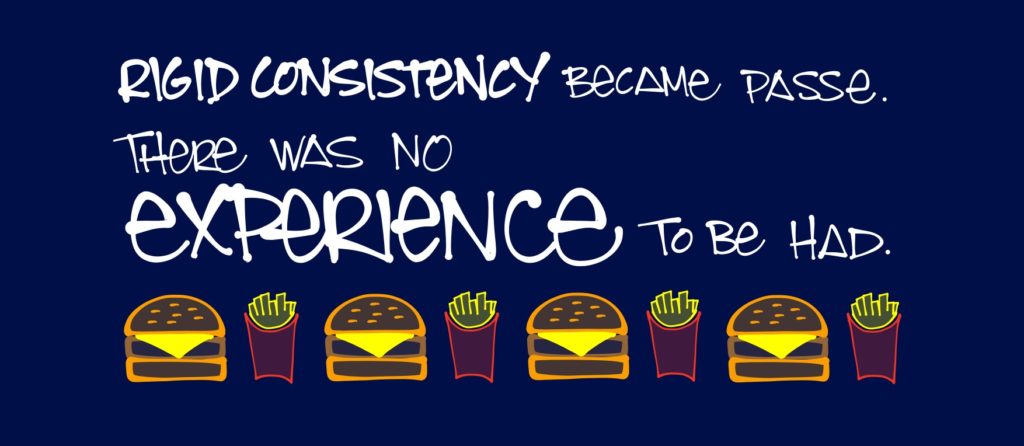Consumerism is Dead
So, I’ve been thinking a lot about this word “experience.” It got me wondering, where does this focus on experience come from? Though it’s clearly been around for a long time, it’s only recently become an object of intense focus.
Think back to the era of great American consumerism—the 1950s through the 1970s. This was a time of huge post-war economic growth, the spread of the American dream, and suburban ideal. It was also a period of incredible growth in mass communications, too, most obviously with television, which created a sort of global community that inspired a series of famously shared experiences—Elvis, the Kennedy assassination, The Beatles, the man on the moon, etc. Camped out in their living rooms, people experienced these things together. And yet, while we watched these incredible transformative events collectively, we did so in isolation, in our own homes, the communication was one-way. If we wanted to talk about it—if we wanted to share our experiences—we had to wait until the next day at school or the office to talk about it.
Marshall McLuhan had it right. The medium was the message. The one-way, mass communication of television had a profound impact on advertising and marketing. This was the great Mad Men-era of push advertising. The goal of this sort of one-way communication was to convince people that acquiring stuff, lots of stuff, preferably the same stuff as your neighbor, was a higher purpose. If your neighbor buys a Cadillac; you needed a Cadillac. Thus was born the Age of Consumerism. More is better was the mantra. Eventually, new forms of communications grew, each one taking hold at a faster pace than the previous—VHS, cable TV, satellite TV, DVDs, PCs, cellphones.
With the advent of social media, however, things changed dramatically. As if overnight, Facebook and YouTube flattened the world. It was the birth of the sharing economy. Broadcast yourself, they said. Every meal, every vacation, every life milestone had to be documented and shared with the world. Suddenly, stuff you had didn’t matter so much as the experience did. The selfie culture was upon us. The Mona Lisa of this new era happened on Oscar Night when Bradley Cooper, Jennifer Lawrence, Julia Roberts, Meryl Streep, and others joined in that memorable selfie. In that instant we were all “friended” by celebrities we could otherwise never approach.
It was the signal of a larger trend. People stopped caring about the endless pursuit to acquire the exact same stuff that other people had. All this consumption left us empty and led to the conclusion that maybe more wasn’t better after all. Mass-produced consumer goods became less desirable. People started sharing cars, not buying them. Zipcar and Uber grew. Ford and GM looked for new ways to capitalize on the sharing culture. Mass-produced food declined, too. McDonald’s struggled. While many say it was because their food is unhealthy, you could look at it and say It’s because all their food is the same in every store in the world. The exact thing that McDonald’s was known for—rigid consistency—became passe. There was no experience to be had.
In response, we saw the rise of the fast-casual trend with companies like Chipotle and Panera, but even those companies are becoming too common and are now being replaced by a new generation of niche restaurants. In Washington DC, we have Cava Mezze, a Mediterranean-themed restaurant offering lamb meatballs, tzatziki, and harissa. The ultimate mashup of social media and fast-casual dining is the “food truck” where each day saw gourmet food peddled on different street corners, the location of which would be announced through social media. The food was great. The concept was great.
…But the experience was greatest of all.
